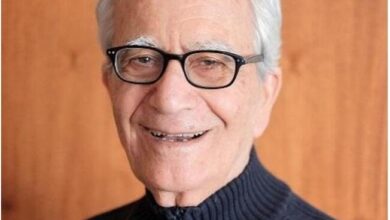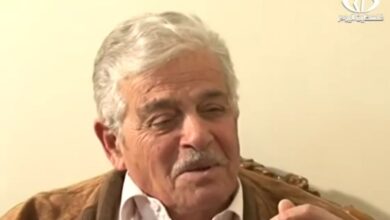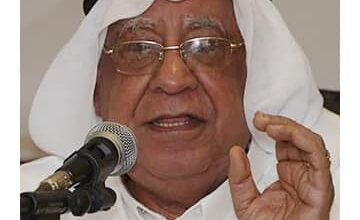The Moroccan Sahara and Arab National Security – Part Two- Dr. Salem Sirrieh: Academic and Writer (Palestine)
Dr. Salem Sirrieh: Academic and Writer (Palestine)

The Moroccan Sahara and Arab National Security – Part Two.
Dr. Salem Sirrieh: Academic and Writer (Palestine)
Moroccan resistance to Spanish and French colonialism:
The Spanish colonization of the Moroccan Sahara lasted for 91 years (1884-1975), and the last Spanish soldier left it in January 1976.Therefore, it cannot be said that the burden of liberation was on the shoulders of the Polisario, which was founded two years before this date.We say that the accumulation of struggle and sacrifices ultimately compelled the invaders to leave the Sahara.In 1959, Allal El Fassi announced that the struggle would continue to liberate the rest of the occupied Moroccan territories in Mauritania, the Sahara, Ceuta, and Melilla 1
The year 1934 AD is the date when the French armies installed the Spanish colonizer in the Western Sahara, which became a withdrawal zone for the mujahideen, as Salvador Bayarres says:
(Between 1924-1932 AD, the Sahrawis organized a real guerrilla war marked by long and rapid disorder, so they made surprise attacks against various colonial military positions, and after the defeat of “um Al-Tunisi” on August 18, 1932 AD, a French mobile group was eliminated, and as a result, the French launched a wide campaign to cleanse the region and disarmto cleanse the resisters, and the repression was, so France resorted to requesting support from Spain, provided that the latter would bring peace to the area under its influence, and thus Spain began to occupy The interior areas of Western Sahara and the establishment of it permanently after its presence remained limited to the coasts, and thus 1934 AD was the year of the actual and final occupation of Spain and its control over the territory, under which Western Sahara was named as the “Spanish Sahara”. 2
Among the Moroccan liberation movements that emerged after Morocco’s independence:
1- The Blue Men Movement in 1961, which aimed to liberate the territories under Spanish control and to unite the Sahara with the motherland, where it took Algeria as its headquarters, and then moved to Belgium to settle in Morocco in 1975
2- The Front for Liberation and Unity Party: This party split from the resistance movement for the liberation of the Saharan territories under Spanish control, and included two political and military parts, demanding integration with the Kingdom of Morocco, so that it began launching cross-border attacks starting in 1975 to pressure the Spanish colonizer to leave. A decision was issued to dissolve it in September 1976 _ (3)
We now return to the Polisario:
Polisario: During the years 1970-1972, the Sahrawi National Movement reorganized itself and its style to become an armed organization under the name of the “Popular Front for the Liberation of Saguia el-Hamra and Río de Oro” (Polisario).
frent Popvlar de liberacion Saguia Hamray Riodeoro (
It held its founding conference under the slogan “With Venice, you get freedom.
The sources indicate that it was founded on May 20, 1972 by Colonel Muammar Gaddafi, who said in his speech on the occasion of the Al-Fateh Revolution of September 1987 (I can talk about the Sahara issue more than any other party because the Polisario – the Popular Front for the Liberation of Saguia el-Hamra and Río de Oro, – we are the ones who founded it in 1972, and we are the ones who trained and armed it to expel Spanish colonialism, and did not arm it to establish a state). Based on the support of the Front as a separatist movement aimed at independence from the Kingdom of Morocco, but as a liberation movement in the face of Spanish colonialism – (4)
Libyan support throughout its continuation until 1984 and 1985 constituted the most important economic and military support, because Libya was the one that opened an unlimited financing line for the Polisario Front, which enabled the latter to buy advanced weapons from the markets of the purchase, enabling significant aid, which continued in the markets of eastern countries. Still, after the Oujda Agreement in 1985 between Morocco and Libya to establish a semi-unity between them, following which lasted until 1987, Libya changed its positions in support of the demands of the stanceshiftedlbu Lysario towards supporting Morocco, where King Hassan IIunder the leadership of Morocco’s position demands, aligned with Morocco’s demands under King Hassan II’s leadership, when Libya changed its position to support Lysario’s. This lasted until 1987. Morocco’s stance shifted, which established a new direction. With diplomatic skill, he severed Libyan support for the Polisario Front, and Libya was content with a position of neutrality, supporting the United Nations’ efforts while maintaining some ties with the Polisario by receiving delegations of Sahrawi students. Nations’ efforts.
. Therefore, Libya tried to balance its positions with both Morocco and Algeria, and President Gaddafi repeatedly declared that the problem of the state was a priority.The most sought-after issue in the Western Sahara is the obstacle to the completion of the Maghreb Union, which has led to a convergence of views between Libya and Morocco.After the failure of the unitary project between Libya and Morocco due to FollowingPeres’ visit to Morocco, Gaddafi declared his support for the establishment of the Sahrawi Republic.
In the wake of the guerrilla war between the Polisario Front and the Moroccan forces, which lasted for 16 years, Morocco began in the early eighties of the last century to build a sand wall around (in the form of stages) the cities of Smara, Laayoune, and Boujdour to isolate the phosphate-rich desert areas and the main desert cities. This separation wall made the most important desert territory safe from the attacks of the “Polisario” militants. After the construction of this wall, Morocco’s budget was drained by several billion dollars. Consequently, Morocco’s position in the region was gradually strengthened, especially in the mid-1980s, following Libya’s withdrawal after it had previously supported the “Polisario” group, which Morocco had opposed. Algeria. This was preoccupied with its internal crisis at the time.
Throughout the years of conflict, thousands of Sahrawis fled to Algeria, where they resided in what became known as the “Tindouf” camps, bringing their number, according to the UNHCR of the Algerian government, to about 165,000 Sahrawi refugees in the five camps near Tindouf. At the same time, United Nations agencies report that the number ranges between 90,000 and 125,000 refugees (5).
While the Western Sahara crisis is one of the world’s longest political and humanitarian conflicts, the region has been governed since 1991 by a ceasefire agreement imposed by the United Nations and secured by UN peacekeepers between Morocco and the Polisario Front, with no final settlement of the conflict yet reached.
Regarding the independence of the region, Mauritania, for its part, withdrew from the sub-Saharan Western Sahara after being exhausted by the guerrilla war waged by the Polisario, which led to the overthrow of the regime of Mokhtar Ould Dada in Mauritania, which had previously demanded it. Due to its inability to withstand the blows of the Polisario, it appealed to France to strike the Polisario and then withdrew from the region. Following this, he. In 1979, it was taken over by Morocco. Between 1975 and 1976, the “Polisario” announced the establishment of the “Sahrawi Arab Democratic Republic” and formed a government in the Tindouf region in the far south of Algeria. Since its establishment, the presidency of the Front was assumed by Mustafa Sid Al-Wali Al-Raqibi for three years until his death on June 9, 1976 during an attack on the Mauritanian capital Nouakchott, to be succeeded by Mohamed Abdelaziz as Secretary-General of the Front and Chairman of the Revolutionary Command Council from August 1976 until his death in May 2016 when it was headed by Ibrahim Ghali. The Moroccan government, until 2010, when it experienced an internal split that led to the emergence of the “Martyrs’ Line” movement, had faced demands for direct negotiations with Morocco regarding the disputed area. In 2016, the Guerguerat border area with Mauritania witnessed tension between the Polisario Front and Morocco, which did not subside until after the UN Mission for the Referendum in Western Sahara (MINURSO) intervened to prevent confrontations, and the two sides withdrew their forces after the invitation of the Secretary-General of the United Nations, António Guterres.At the end of last October, Sahrawi activists closed the only border crossing opened by Morocco in 2002 to deliver its products to West Africa through Moroccan forces announced in November 2020 that they had expelled a group of Polisario Front activists accompanied by four armed vehicles, after they blocked the road at the Guerguerat crossing, announcing the launch of a military operation to reopen the road leading to neighboring Mauritania after its closure. On the other hand, both the Polisario and Algeria considered the intervention of the Moroccan army “an act of aggression against unarmed civilians.” (6)
Margins
1- Ben Youssef Ben Khadda – Western Sahara conflict and international legitimacy, PhD thesis, 2013-2014, University of Algeria
رابط التحميل https://www.usc.gal/…/ceso/descargas/Ph-D_Shaanan_2007.pdf
2 – Hadia Nasira – Master Thesis – Western Sahara Issue 1975-2000 – University of the Valley – Algeria 2014Download link: https://www.univ-eloued.dz/images/memoir/file/M.H-021-1.pdf
3- Western Sahara crisis: causes and expectations – Barq Research Center –
https://barq-rs.com/%D8%A3%D8%B2%D9%85%D8%A9-%D8%A7%D9…/
4- Taher Massoud, Western Sahara conflict, between Morocco and the Polisario, 1st Edition, Dar Al-Mukhtar, Damascus, Syria 1988), p. 1.
5- Leila Badie Ainati, Polisario Leader and Revolution, Dar Al-Masirah, (Beirut 1987)
6- Hadia Nasira, previous source.





